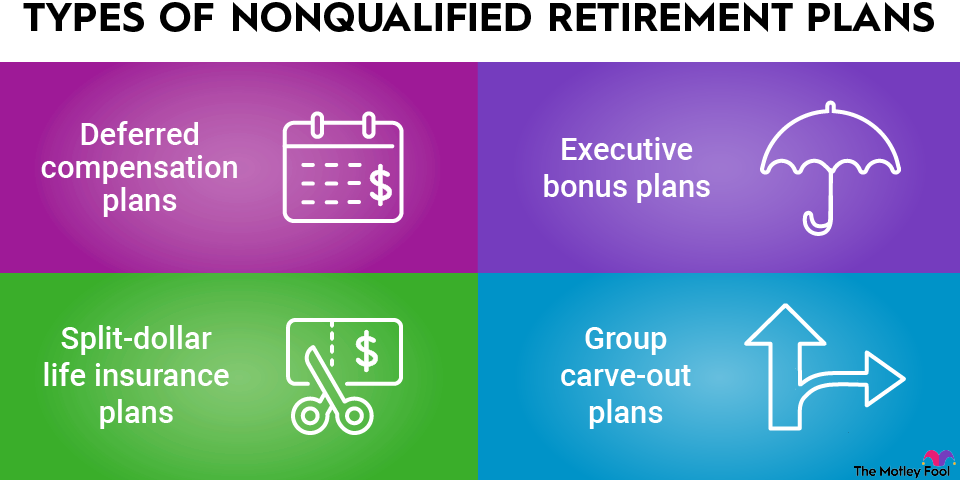Nonqualified retirement plans are employer-sponsored retirement plans that aren’t subject to the rules laid out in the Employee Retirement Income Security Act of 1974 (ERISA). The law created standards for plan participation, funding, and reporting. Nonqualified retirement plans are distinct from the more common qualified retirement plans, such as 401(k)s, which are subject to ERISA rules.
You usually find nonqualified retirement plans among executives and other highly paid employees who have special needs that a qualified plan can’t meet. Here's a closer look at how nonqualified plans work.

Types of nonqualified retirement plans
You're probably familiar with common retirement accounts, such as the 401(k) and IRA. But nonqualified retirement plans aren't as widely known. The four most common types are deferred compensation plans, executive bonus plans, split-life insurance plans, and group carve-out plans. We’ll look at each in detail below.
Deferred compensation plans
A deferred compensation plan, such as a Supplemental Executive Retirement Plan (SERP), is an employer-provided plan that gives the employee supplemental retirement income. The employee does not have to pay taxes on the income until retirement.
There are two basic types of deferred compensation plans. In a true deferred compensation plan, the employer defers part of the employee’s income, similar to how you might defer part of your paycheck into a 401(k). A salary compensation plan means the employer continues to pay the employee a salary in retirement. This is often lower than the salary they received while they were actively working.
Executive bonus plans
An employer takes out a life insurance policy in their employee's name and pays the premiums. It’s set up so the employee can access the cash value of the policy after retiring. The employee is generally responsible for paying taxes on the payments their employer makes, although some employers may help the employee cover the taxes.
Split-dollar life insurance plans
The employer pays for permanent life insurance for the employee, and the employee and employer agree upon how to split the policy. Both employee and employer may split the cost of the premiums. Upon the employee’s death, the employer may recoup an amount equal to what it put into the plan. The employee’s beneficiaries would claim the rest.
Group carve-out plans
Group carve-out plans replace group term life insurance coverage of more than $50,000 with an individual universal life insurance policy. The plans provide extra coverage to help the employee avoid taxes on group life insurance over $50,000.
Advantages of nonqualified retirement plans
Nonqualified retirement plans enable highly compensated employees (HCEs) to save more money for retirement than they could in a qualified plan. Qualified plans are subject to annual contribution limits. They also have discrimination tests in place that ensure that HCEs do not contribute substantially more to their retirement plans than the company's average employee. Often, such tests reduce the maximum contribution HCEs can make.
Nonqualified plans don't have such limitations, so HCEs can contribute as much as they choose. They may still contribute to a qualified retirement plan as well. But once they max it out, they can put extra funds in the nonqualified plan to increase their nest egg much faster.
Nonqualified retirement plans also enable participants to defer income taxes on part of their earnings until retirement, when they will presumably be in a lower tax bracket. The deferment helps them keep more of their money than if they had to pay taxes on their earnings throughout their career, although they still must pay Social Security and Medicare taxes in the year they earn the money.
Finally, nonqualified plans are often tailored for the individual in question. They don't have age restrictions on when participants can take penalty-free withdrawals. Some don't have required minimum distributions (RMDs) either.
Employees and employers can work together to decide upon a distribution schedule that works for both. An agreement may enable employees to access some of their retirement savings before age 59 1/2. You typically can’t make penalty-free withdrawals from qualified retirement plans before this age.
Nonqualified plans don't have age restrictions on when participants can take penalty-free withdrawals
Disadvantages of nonqualified retirement plans
A typical employee won’t have the option to contribute to a nonqualified retirement plan even if they want to. Highly personalized plans are more complex than traditional retirement accounts. It would be a challenge for employers to create and maintain one for each employee. Consequently, many only offer these plans to executives, using them as a perk to attract and retain top talent.
Contributions to nonqualified retirement plans are typically nondeductible for the employee. The employee must pay taxes in the year contributions are made. The rules are similar to those of a Roth IRA except Roth IRAs promise tax-free withdrawals later. Nonqualified retirement plans require the employee to pay taxes on their earnings as well. Taxes, however, can be deferred until funds are withdrawn.
In addition, nonqualified retirement plan contributions are considered part of the company's assets, so they're not shielded from creditors. If a company goes bankrupt, it may have to draw on the funds in its employees' nonqualified retirement plans to cover debts. Should this happen, the employee won’t get the promised money. It’s a risk employees don’t have to worry about with qualified retirement plans.
Nonqualified plans may also have strict distribution schedules that determine when you can withdraw funds from the account. You usually cannot withdraw funds before an agreed-on date. You're also not eligible to borrow from the plan like you can with some 401(k)s. There’s no way to roll over your nonqualified retirement plan if you decide to leave the company, either.
Nonqualified retirement plans can make sense for executives and certain high-earning employees. But outside of this group, you're unlikely to find them. For the average person, a qualified retirement plan will be a better fit. The qualified plans provide better protections and greater flexibility for moving between jobs.

